Kevin Costner Reveals The Epic Journey Of His Cannes Western ‘Horizon’ And Has His Say On ‘Yellowstone’ Rancor
- Oops!Something went wrong.Please try again later.
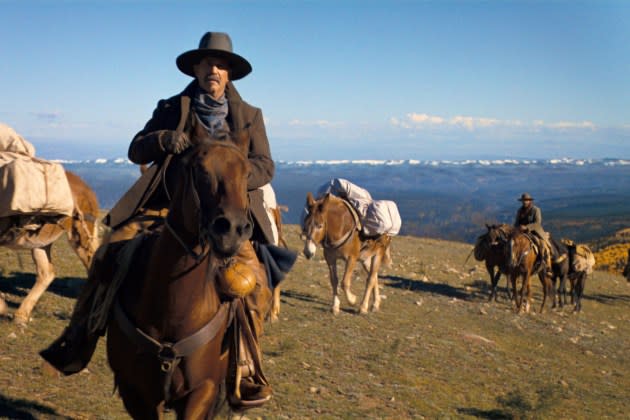
Kevin Costner has turned his Santa Barbara home into a fully-fledged post-production facility. In one room, editors are cutting the first leg of Horizon: An American Saga he’ll premiere in Cannes. In another, an editor is working on Part Two. In a third, there is an assemblage of a documentary on the making of the four-film series. Down the road is the 10 acres of property that Costner put on the table to make his dream post-Civil War project a reality. Here, he discusses this adventure in serialized storytelling, following a group of characters riding west, and the drama surrounding his pending exit from Yellowstone.
DEADLINE: You’ve risked a lot of money here on a film you’ve ruminated on for decades. How does it feel, having one finished and headed to Cannes, and a second close to being done?
More from Deadline
KEVIN COSTNER: That’s kind of an interesting question. I will say this to you. We don’t know how much time we have on this Earth. You’re going to drive home. You don’t know if somebody gets on the on-ramp going the wrong way. This happened to a guy I liked, who loves movies and who I’d just talked to, and in an instant he was gone. I’ve lived my life the way I’ve lived it, and if I would be taken tomorrow, and didn’t make the third and fourth, it wouldn’t be as important as the fact that I got to make the first two. There was a window in to where my heart was. And when people speak of you later, they should speak of your heart. Well, who was this person? I have done what I’ve intended to do, and I’m not Ahab, but I have my own vision of what I want to give people.
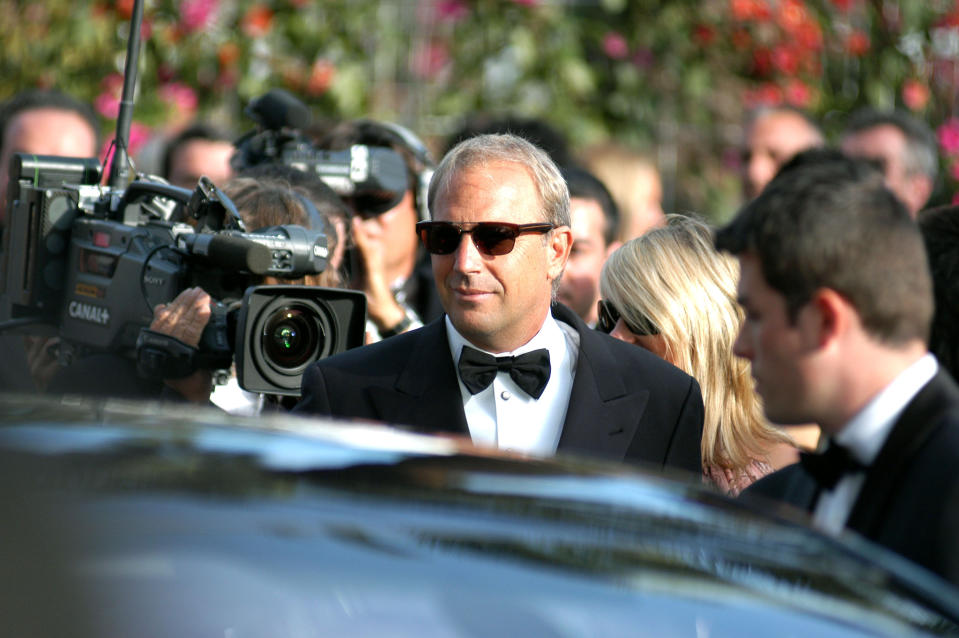
DEADLINE: This your first film at Cannes?
COSTNER: I was there once, selling Open Range, but it wasn’t even in a competition. It was just to meet the international buyers. I’ve never been there for a movie. I went on the red carpet once and watched one of the Matrix movies, which was exciting. This was part of what I wanted to do because I knew I would have the international partners, and this was the right movie with me directing to come with. I would like to come back for the third one. I would love to go to the Venice Film Festival for the second film, but I don’t know if they’d show it if the first one went to Cannes. Maybe they won’t want a movie that is released in August. But I’ll have a third and fourth film.
DEADLINE: A highlight of our last Cannes Disruptors magazine had you and Francis Ford Coppola discussing why two mavericks were gambling their own money on passion projects others wouldn’t finance. Now, each of you will be at Cannes premiering these movies.
COSTNER: He finished his? That’s great.
DEADLINE: I can’t think of another filmmaker ever, who put $120 million of his own money into a movie like Coppola did with Megalopolis. It won’t be released until the fall, but he’s following the trail of where he brought Apocalypse Now to Cannes and it turned around the negative narrative. The press has been skeptical once again, and he responded by putting the film in Competition that first Friday night, four months before the film opens. This is a guy that has…
COSTNER: Brass balls. You know, I’m on schedule right now at $98 million, and when I do the fourth film, it will push me over $100 million.
DEADLINE: You’ve had the cushion of your Yellowstone salary. He preserved the long-term future of his wine empire by aligning with a larger competitor, and it created a windfall that allowed him a credit line to make his movie. He said, even if Megalopolis fails to earn out, his children will still inherit his vineyard in Napa.
COSTNER: You realize, I can do this. My kids might not get the 10 acres [the waterfront Santa Barbara property Costner put at risk]. But they’re going to have homes, and they’re going to have my legacy and the wealth that follows, from my estate. They can make up their own lives. But I’m not going to let anything hold me back. They can make it seem like it’s an obsession, but it’s something he wanted to do. He’s not hurting anybody. He figured it out. He’s also explained to his children. Mine are so clear about it. Dad, you do what you want to do. We don’t need all these things. We’ve enjoyed all these things, but we don’t need them. They just don’t want to see me just work myself to death.
I feel I’ve made a movie for the people, period. This isn’t a movie from me. I felt like it was my turn in my career to tell a story. This is the one I choose to tell. It’s just my turn.
DEADLINE: You could also take an actor-for-hire job. Yellowstone…
COSTNER: Yellowstone was really good. Hatfields & McCoys, that was good.
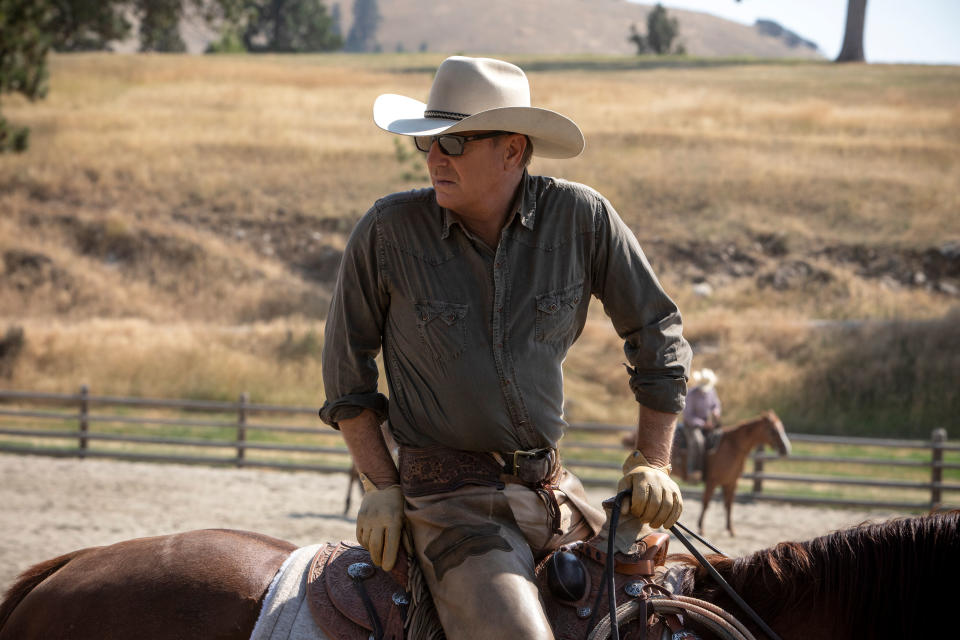
DEADLINE: Yellowstone mushroomed into the biggest hit on basic cable, the ratings growing each year. Now, it has imploded in squabbles and rumors about you putting this movie first and trying to squeeze your windows of availability to finish your John Dutton character. Where does it stand with Yellowstone?
COSTNER: Well, I haven’t felt good about it the last year, what with the way they’ve talked about it. It wasn’t truthful. So now I’m talking about a little bit about what the real truth of it was. I made a contract for seasons five, six and seven. In February, after a two- or three-month negotiation, they made another contract. They wanted to redo that one, and instead of seasons six and seven, it was 5A and 5B, and maybe we’ll do six. They weren’t able to make those. Horizon was set in the middle, but Yellowstone was first position. I fit [Horizon] into the gaps. They just kept moving their gaps.
DEADLINE: A Gala premiere at Cannes seems so exciting. Who’ll come with you?
COSTNER: Because I’m financing this and doing a lot of this myself, in this instance it was just going to be me and Sienna [Miller]. And then I got to thinking about it and I’m going to bring all the women. I sent an email to all the guys, that I’m taking the six girls. They’re never celebrated enough. And I said, it keeps me from doing this weird political picking back and forth. So, I’m going to take Ella Hunt, and Sienna and Abbey Lee, Isabelle Fuhrman, [Native American actress] Wasé Chief… Anyone else that happens to be in Europe, I’ll get you a ticket. But I’m not a studio.
DEADLINE: Francis Coppola is going through the same thing; he doesn’t have a distributor yet, so anyone who comes, he has to pay. But for the pageantry and the elegance and the global platform, there’s nothing like the glamour of a Cannes premiere and the long walk up the stairs after the red carpet.
COSTNER: I’m so thrilled to be going there. And listen, I don’t want to get down in the gutter with the Yellowstone thing but what I’m telling you is straight up. I have taken a beating from those f*cking guys and I know a lot of times where it’s coming from. I just elected not to get into that. But if you know me well enough, I made Yellowstone the first priority, and to insinuate anything else would be wrong. I did not initiate any of those things. They did. They were doing a tap dance and this poor guy was also having to write so much. And I don’t know why they didn’t stick up for me. You asked me the question, I’m going to answer it. I don’t do press outside my movies. I don’t live in the press, in between. Now I’m promoting my movie. I could say “no comment” all the way through. I won’t say my life is fair game or that any questions are fair game, but this is a realistic question. I will address it. They should have known that there was going to be an opportunity for me to say something. I didn’t have to answer the slings and arrows over the last year and a half, because I’ve just been busy working. They’ve been pretty slick about keeping their hands off; nobody was ever on the record.
DEADLINE: Coppola has endured his share of that, as people who haven’t seen the movie tried to paint a false picture of an out-of-control movie that can’t get a distributor. Past accomplishments don’t stop people from taking shots at him, and you.
COSTNER: No, they don’t. And for Francis, there’s that line he’s got in the third Godfather, just when I’m out, they suck me back in. Neither one of us should be surprised. I love how people who have seen it are responding to Horizon. You were the first. I hope the same for Francis, but we’re not immune to just being picked at.
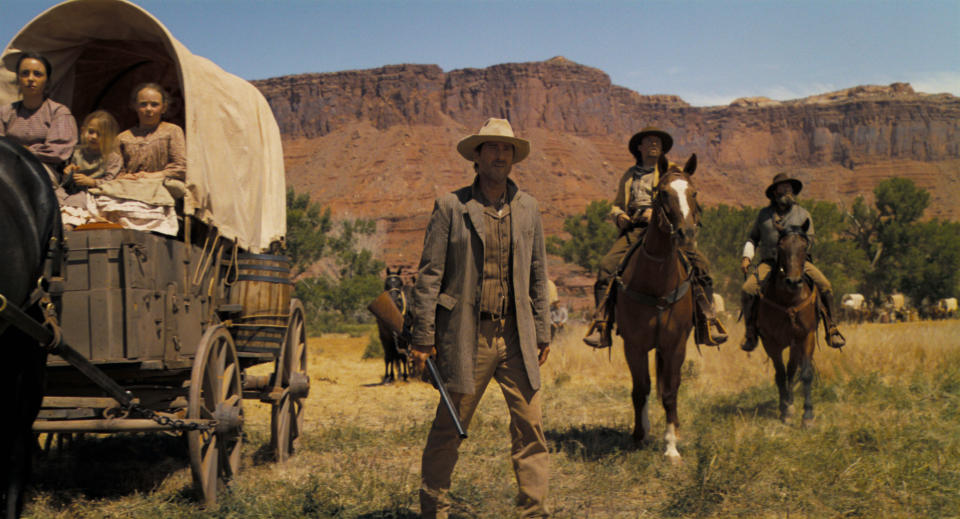
DEADLINE: If you worry too much about this, can’t it make a filmmaker fearful? Is it best to trust your gut and collaborators?
COSTNER: The misnomer of collaboration is, if you don’t take my idea, you’re not a good collaborator. I don’t think that flies. Collaboration is about an environment where you can say what you want to say and the other person will sincerely consider it. But somebody has to protect the rhythm of the movie. You can never make decisions out of fear. You can think, I feel like I’ll lose my audience here, but if the scene plays, I’ll get them back. I watch time, I’m agonized by it. It’s not like I’m out there going, I don’t give a sh*t what people think. That’s not who I am. I focus first on how the movie looks and then I worry about trying to do as much as I can with it. I screened this movie at 3:15. First one was 3:52 and at first I didn’t know how to get five minutes out of that. Then I took it to 3:29, then 3:24, then I got it to 3:15. I screened that in Vegas, and then got down to 3:06. I didn’t think it had an inch more to go. Then I dropped beneath three hours. Got to 2:50, now I’m at 2:45, but I’m going to put some back.
DEADLINE: Sounds like a good length for the first of four movies…
COSTNER: Oh, shut up. I don’t care if you think 2:50 is the perfect length for my movie.
DEADLINE: Last year when Marty Scorsese was on the cover of this magazine, he was troubled that his 3 hour, 26-minute running time became a big part of the narrative of the film.
COSTNER: Well, it ain’t going to be 2:45, Mike. I’m going to put some stuff back in that I need to put back in, and I’ll see if it works. But listen, if I had the same feeling at 2:30 that I have at 2:45, I’d make it 2:30.
DEADLINE: You’ve described my personal weight-loss fantasy. If I could get down to 175, I might say that putting back a couple pounds would be best. But first you got to get down to 175, and that’s where my plan fails.
COSTNER: I get what you’re saying, the hardest part was getting to 2:40. And I was teasing you when I said to be quiet. I do think about all this, because I own it. Would I like a screen time that allowed me an extra show each day? Nobody would like that more than me. When you put your money in like I have, like Francis has, you need to know what we like. We are just dealing with our own UFOs. We see something and we can’t back away from it.
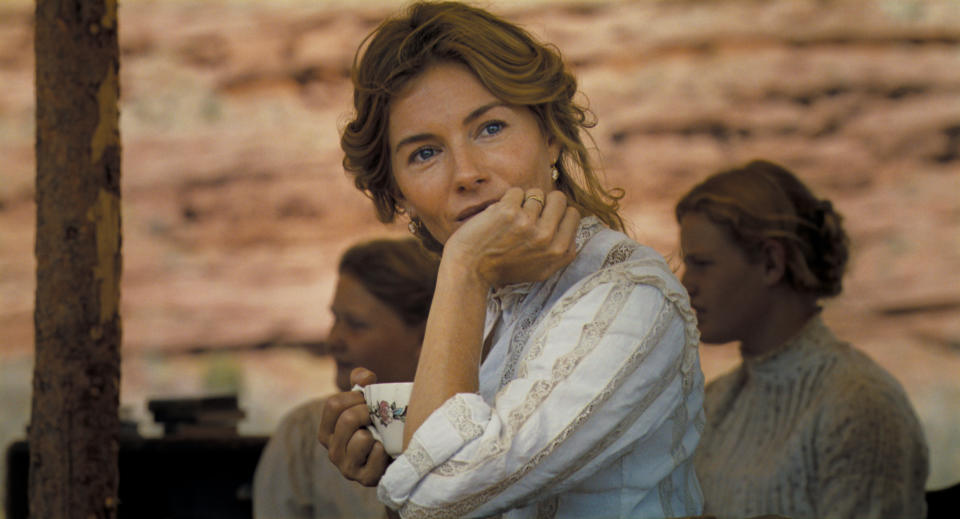
DEADLINE: Does it feel like a little part of you dies with each few minutes you cut from the film? How hard is that dance in a sprawling film about Manifest Destiny?
COSTNER: I remember the first assemblage of Dances with Wolves was five and a half hours. It’s painful, but there is pleasure. You don’t think you can, and then you realize you can. Dances, I cut two and a half hours out of it because I knew it wasn’t working as well as it should. I’ve got [Horizon] where I want it.
DEADLINE: So, you have locked the first two films?
COSTNER: The second one is not locked. I’m still looking to cut some things. It’s 2:45, that number you seem to f*cking be in love with.
DEADLINE: When do you plan to start the third film?
COSTNER: I wanted to start April 25th, but I’ve got to find the money. I wanted to start May 6th, but I needed to find the money. I’ve moved myself to May 13th, and I’m going to start my movie. I don’t give a sh*t now. I’m just going to start it.
DEADLINE: Do you worry, what if the audience doesn’t come back for the other three installments? Nobody has done what you’re doing here, not on a movie screen anyway.
COSTNER: Who doesn’t come back?
DEADLINE: The audience.
COSTNER: Well, the reality of that is the film lives and whatever are the viewing habits, I own it for the rest of its life. Would you want to own these two pieces for the rest of your life? Hell yeah. And every five years, license them around the world. Relicense them here in America. The difference is I own that, because of the risk I’ve taken. Why is Vegas there? It’s for all the people that lose to the house. Why are studios there? It’s because those movies continue to make money, well beyond their opening weekends.
DEADLINE: Even with the death of the DVD?
COSTNER: Death of the what? DVD is not dead, at all. That’s what they’d have you believe. Maybe it’s not making the same amount of money, but just try to go ask for that from the studio. They won’t give that up. A lot of people that like my movies, they can’t get to a theater, and they’re waiting for that moment. You can’t make your film for the opening weekend. You have to make it for its life. So I’ll go to Cannes, it’s a great honor, then do Jimmy Kimmel, and then I’ll fly to my set and start directing.
DEADLINE: I’m not a risk taker, but I admire those who bet on themselves.
COSTNER: Neither of us is Ahab. I first saw obsession in my life when I saw Moby Dick with Gregory Peck. I was too young to articulate what it meant, but I was afraid of that ugly man after the white whale. There was this prize he was determined to win, and it turned into something more. He was willing to take men down. And the difference with Francis is, and the difference with me is, we may have a bit of Ahab in us, but our obsession isn’t such that we would take other people down. We put ourselves on the line, we shoulder it all. Other people get paid. For me, it’ll be two or three years without a salary from Horizon. Try it, see how it feels.
DEADLINE: No thank you.
COSTNER: Try doing that, with a lot of money going out. He’s not crying to anybody. I’m not crying to anybody. But if you think it’s easy, try it.
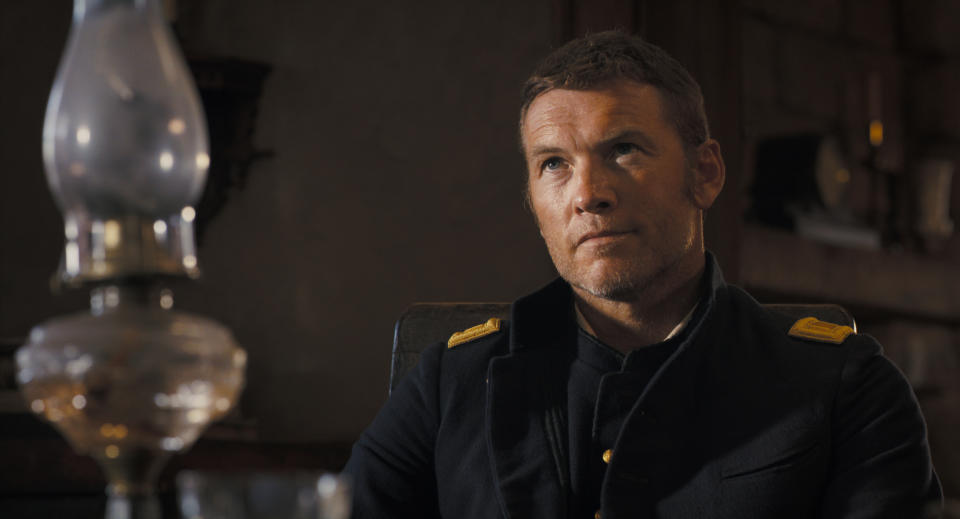
DEADLINE: With Yellowstone, I thought it had gotten to a place where your needs for Horizon meant you were not going to be there regularly enough. And when you came, those other actors were upset they would have to do scenes that would be spread through future episodes…
COSTNER: That’s not true. There were blocks of time that we didn’t get 10 episodes done. Basically, we were starting in April and May, and we’d usually go through August. We’d do 10. We didn’t even get 10 done during that time. I only worked 43 days. So that’s bullsh*t. That’s a lie. That’s not correct. They sent me away for seven days to go to London, to go to England during Covid, to do [promotion]. They made the contract and they picked the days.
DEADLINE: So, in your mind, you lived up to what they asked?
COSTNER: Not in my mind, in the truth of the contract. I lived up to it. In fact, I gave them 25 of my days for this B thing in November and December. What they called 5B. The whole month of March.
DEADLINE: So you shot that?
COSTNER: No. I didn’t shoot 5B. There was no script. And then things imploded. You’ve been reading one version [of this behind-the-scenes drama] for a year and a half. I left my movie to be on time for them for 5B. I left exactly when they wanted, and it made it hard on me. It turns out they didn’t have the scripts for 5B. They needed four more days just to complete the first eight episodes. I left early to give them what they needed to have a complete eight, and I felt bad that the audience didn’t get 10. They didn’t have the scripts for anything else. So, what you read in the end was that I said, “Well, look, I’m doing my movie. If you want me to work a week because you want to kill me or whatever else, I can give you a week.” I really didn’t have that week to give them, but I said, I’ll do that. And then they [spun that] into, I only wanted to work a week.
DEADLINE: So this was a gesture on your part, not an ultimatum?
COSTNER: I’m trying to help you. You haven’t been able to meet the deadline either on the first season completely, the B thing or the sixth season. There were no scripts. I said, “Look, if you want to end this elegantly, the best I can do is give you a week. And if you can figure out a storyline…” I’m usually working six or seven days per each, whatever they are. And they took that and a source on their side spun that into, well, he only wants to work a week for a whole season. Do you think that’s who I am? I’ve never missed a day of work. I’ve never left before fulfilling my contractual obligations. A lot of times, I stay as much as I can. In fact, I worked the nine-day stretch just to try to help them in July, when I was starting [Horizon] August 1. I worked a Saturday and Sunday for them, and they still needed four more days. I gave it to them, when I thought we were going to do this so-called B, but there was no B thing. I was just going to give ‘em those extra four days.
They weren’t ready to do anything with them because the scripts weren’t there. There’s a lot of product they were putting out.
DEADLINE: Taylor Sheridan has been writing a lot of shows…
COSTNER: That is fine, but they were silent and that bothered me in the world of how you do things. Why don’t you stick up for me? I went and sold this thing for you. I was going to only do one season. I made it for three. I fulfilled three. So, I went from one to three, then I did a fourth one for them and they wanted to do three more. So, I made the contract to do that. They imploded. I had a contract to do five, six and seven. I was contracted to do that. There’s nothing I could have done to get out of that, nor was I trying to just figure out how, when we started. When we finished, I wanted to do Horizon. It all happened because they shut down one whole season, didn’t tell anybody and I didn’t work for 14 months.
DEADLINE: Why did they shut down?
COSTNER: Didn’t have the scripts. And they wrote these other three shows. They don’t ever talk about that. And all they did was remember we were releasing the series in June, then it moved to October. They covered by changing their release pattern. That time was about a 14-month period. I said, “I can’t ever go through that again, where you shut down for over a year and I don’t have something in line to do.” All I did was protect myself, but I didn’t put myself in first position, over Yellowstone. I filled the gaps. Do you see that?
DEADLINE: I do.
COSTNER: There were three negotiations, Mike. I didn’t initiate any of that.
DEADLINE: It would seem something that could be worked out if only you and Taylor Sheridan sat down man-to-man and hashed out all this acrimony…
COSTNER: Well, we did on the first one, and that’s why I signed it to do February. And then we weren’t doing that, and [Season 5] went from 10 episodes down to eight. So don’t talk to me about man-to-man. I was straight up with him and he said what we would do and I believed him and we didn’t get there.
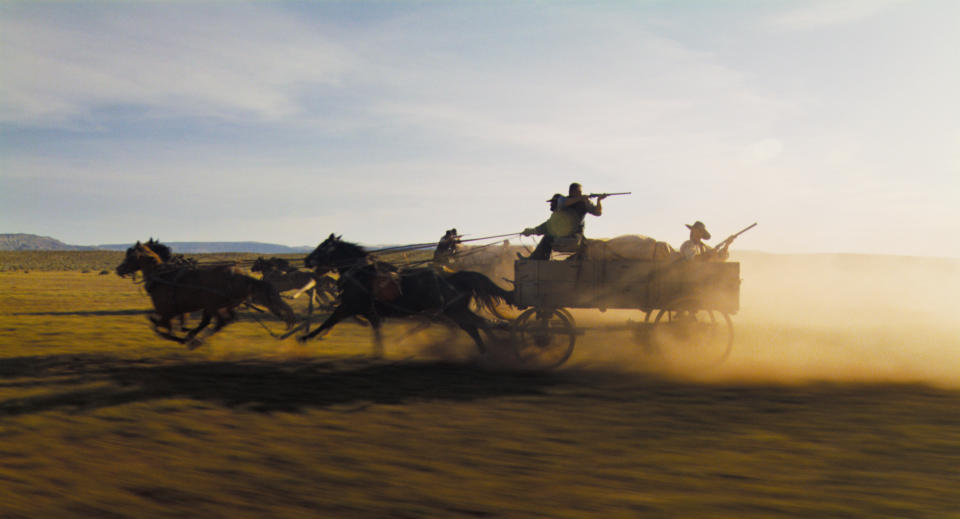
DEADLINE: What happens now?
COSTNER: I’m very open to coming back. If they’ve got so many other things going on, maybe this circles back and it’s a really cool two seasons. Or end it, if the writing’s there and I’m happy with it. I’m open to that. But I took a beating over these guys not speaking up for me and allowing crazy stories to come out.
I’m not happy about that. But if the writing is there, I will be there too. They had first position. I didn’t do Horizon because I was tired of doing Yellowstone. That’s a bullsh*t story. I didn’t do Horizon to compete with Yellowstone. This is something I’ve had a long time. Taylor read that script three years earlier when he was contemplating other writers [for Yellowstone]. I said, well, you can look at what John [Baird] and I did, not that I think I’m qualified. I think you write Yellowstone beautifully. So, he read that and knew what the thing was about. It’s just that simple: Paramount and 101 Studios mismanaged this. They had me for five, six, and seven. I agreed to do it. And then they steadily began changing their format. And what about the year that went missing? That 14 months?
DEADLINE: Seems like that happens when it comes down to an auteur showrunner. TV followed firm hourlong time slots, until Kurt Sutter told FX some of his Sons of Anarchy episodes ran long. Suddenly, an hour stretched beyond that. Taylor Sheridan has done a lot of other shows, including the epic Yellowstone spinoffs 1883 and 1923. That is a lot of output for one writer, while remaining the main writer voice of Yellowstone…
COSTNER: He should be the main voice of it and all those other things. But everybody lives with a contract and they were comfortable signing. Two companies have to sign the contract they signed with me. I’m a single person. I signed the contract. And I’m not a person who is [inflexible]; every season we didn’t start on time and every season we went over. I dealt with that through seasons one, two, three and four, and didn’t say a word. When they canceled a whole season to make room or whatever, I didn’t even complain about that. I’m only talking about it now. Five years ago, when they did that, I knew I had to be in position that if they ever did that again — if you do something once you’re capable of doing it again — that I would know what I was going to do. And I wanted to work more than once a year. And I’d only worked at that point in time once a year and I wasn’t used to that.
If you aren’t going to really start when you say you’re going to start and you’re going to fudge at the end — I understand production, I get that perfectly. Writing is really hard. I get it. But in my instance, I have real obligations. I had 400 people waiting for me on August 1, and I worked a nine-day week to help them as much as I could. And then I went to do my thing with 20 days of prep or 15 days of prep. Try making a movie that way.
DEADLINE: They are making deals with your other core castmates, Kelly Reilly, Cole Hauser, Luke Grimes, Wes Bentley. And then finishing Yellowstone before starting a new chapter.
COSTNER: I think that they should do whatever they want to do. Am I open to coming back? I’ve never been in a position to tell them what to do. I can only do what I can do.
DEADLINE: You haven’t seen the final scripts?
COSTNER: I’m not involved in any of that stuff.
DEADLINE: I remember you saying that on Dances with Wolves, there was a director who was going to do it who didn’t want to have your John Dunbar character on horseback, riding across the field and drawing their gunfire. It was a major reason you made your directing debut. That must have been tough to hear.
COSTNER: He didn’t want the whole Civil War thing. And the direct result of that scene was, he was trying to commit suicide. And in the narration he says, in trying to commit suicide, I was elevated to the status of a living hero. And so that sets the stage.
DEADLINE: That living hero kept his leg when his defiant move was noticed by Union Army commanders, who put their best surgeons on saving a leg that lesser doctors were going to amputate.
COSTNER: The general said, we got a man here whose leg needs saving. What happened is there are three or four lines, very sparse, in 10 minutes. It was so easy for that particular director to say, let’s just start with him in the middle of nowhere. I listened to that, coming out of somebody’s mouth who didn’t want to hurt the film, and was coming out of their own experience of dealing with studios. Why should I shoot that? They’re going to want it gone anyway. What mentality was I dealing with? I can’t tell you. But that was too much for me. So that’s a no. In my mind, that wasn’t being stubborn, I guess, unless I was being stubborn for the movie.
Best of Deadline
Sign up for Deadline's Newsletter. For the latest news, follow us on Facebook, Twitter, and Instagram.

